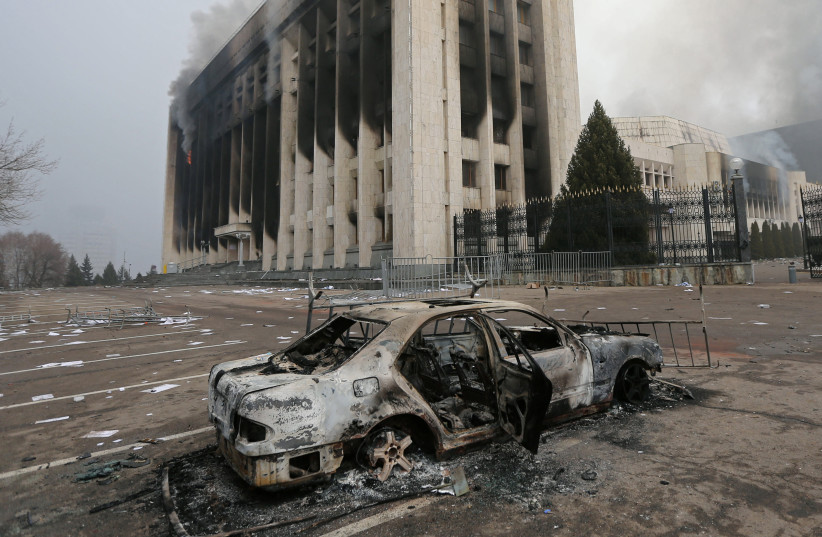Kazakhstan's incumbent president Kassym-Jomart Tokayev secured a landslide victory in Sunday’s snap presidential election, the country's Central Election Commission announced Monday, saying that preliminary data showed him winning 81.31% of the vote.
For more stories from The Media Line go to themedialine.org
The results closely matched the exit polls released after voting ended, which showed Mr. Tokayev receiving about 81% of the vote while the next closest candidate received less than 5%.
"The people have clearly expressed their confidence in me, and we have to justify it," Mr. Tokayev said as the exit polls came in.
The president has touted himself as a reformist leader capable of uniting the country, stymying opposition and consolidating power, even as pushed aside his authoritarian predecessor Nursultan Nazarbayev.
Domestically, the president has to deal with simmering tensions in the country following January unrest in which more than 230 people died in riots sparked by high fuel prices.

Ömer Kocaman, the deputy general secretary of the Organization of Turkic States, told The Media Line that Kazakhstan is going through “tremendous changes and transformation. It’s an historic, important election for the country that is going through the reform process.
Mr. Kocaman spent the last two days visiting polling stations around the capital Astana. His organization is part of several international observers who were invited by the government to monitor the election, and he said they were satisfied with what they saw.
“I can say it was quite transparent and participation was high, and elections in the country took place according to the national league of the country and I can say it was in compliance with the international standards practices.
But not everyone agrees. No official invitation was extended to United Nations or American election observers, and some Western organizations have criticized Kazakhstan’s failure to meet electoral recommendations.
Speaking one day after the elections, the Organization for Security and Co-operation in Europe (OSCE) mission said that Kazakhstan's presidential polls lacked "competitiveness" and highlighted the need for improvement.
"The 20 November early presidential election took place in a political environment lacking competitiveness, and while efficiently prepared, the election underlined the need for further reforms to bring related legislation and its implementation in line with OSCE commitments to ensure genuine pluralism," the mission said.
Recent protests complicate Kazakhstan's situation
Domestically, the president must deal with simmering tensions in the country following the January unrest in which more than 230 people died in riots sparked by high fuel prices.
Kamran Bokhari from the Newlines Institute for Strategy & Policy in Washington DC told The Media Line that the election was a “test” for the government to show how sincere it is in the reforms that President Tokayev had introduced over the summer.
“This is the first electoral exercise since that time,” he said, adding that he was pleasantly surprised at the lack of security presence at the polling stations he visited.
“The fact that there were no security forces told me two things, one is that the situation is stable. The government was confident that they didn’t need to do that, and it also demonstrated more importantly that voters were not being coerced to vote in one way or another.”
The country has been relatively quiet and stable since the bloody clashes 10 months ago. Even so, tensions do persist, with reports of the arrest last week of seven opposition supporters accused of an attempted coup.
Mr. Tokayev will now turn his attention to several pressing issues, among them the delicate relationship with neighboring Russia, his country’s biggest trading partner.
Central Asia's largest country is rich in natural resources and located at the crossroads of important trade routes. While Tokayev took a more neutral position on the war in Ukraine, Alexandra Perminova, a researcher at the Institute of China and contemporary Asian countries of the Russian Academy of Science, told The Media Line that Moscow’s ties with Astana run deep.
“Russia and Kazakhstan are strategic partners,” she said.
“They have their relationship in view of strategic partnership and long term that is to have different strategies and different united companies in different frameworks, for example international [and] regional organizations. Most of all these countries are friends in a way of their interactions on different levels.”
The 69-year-old Tokayev, who came to power in 2019, cruised through the election and the five opponents that challenged him were little known.
None of his rivals managed to reach double digits in the vote, while 5.8% of voters cast their ballot against all candidates.
It’s unclear when President Tokayev will officially begin his new term. He has limited himself to a one seven-year term and only time will tell if he will respect the constitution and the people’s will.
The electoral commission gave an estimated turnout of just over 69% among the 12 million eligible voters.
